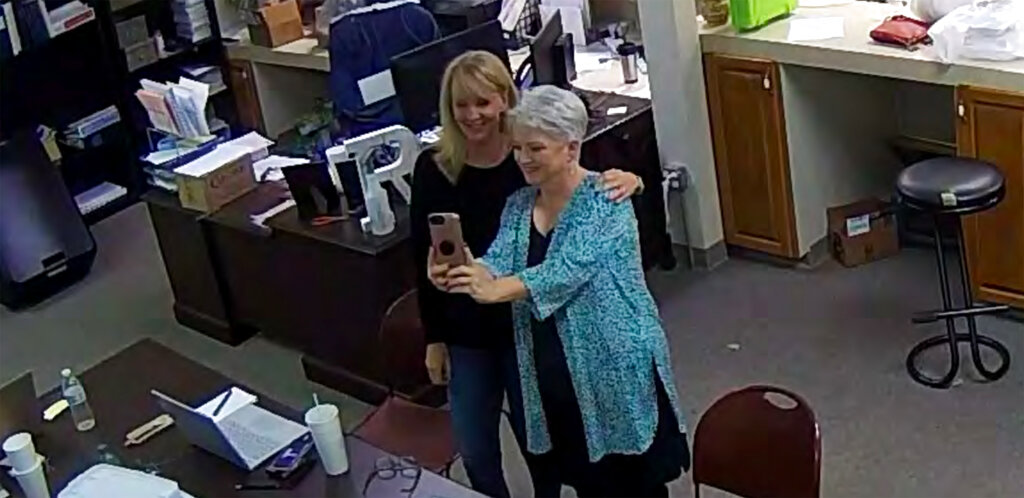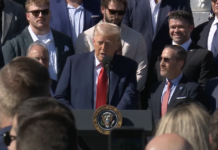
ATLANTA (AP) — A Republican Party official in Georgia told a computer forensics team to copy components of the voting system at a rural elections office two months after the 2020 election and spent nearly all day there, contradicting her sworn deposition testimony about her role in the alleged breach of the equipment, a new court filing says.
The filing late Monday is part of a broader lawsuit challenging the security of the state’s voting machines that has been drawn into a separate investigation of former President Donald Trump’s efforts to overturn his loss in Georgia. The apparent breach happened on Jan. 7, 2021, the day after a violent attack on the U.S. Capitol by Trump supporters seeking to stop the certification of the election.
Interior security camera video from the Coffee County elections office shows Cathy Latham, the county Republican Party chair at the time, welcomed the computer forensics team when it arrived, introduced the team to local election officials and spent nearly all day there. She also instructed the team what to copy, which turned out to be “virtually every component of the voting system,” the filing says. The video directly refutes Latham’s testimony in a sworn deposition and her representations in filings with the court, the document states.
The filing comes in response to Latham’s attorneys’ attempt to quash subpoenas for her personal electronic devices, including any cellphones, computers and storage devices.
Robert Cheeley, an attorney for Latham, did not respond to an email seeking comment. He previously said his client doesn’t remember all the details of that day. But he said she “would not and has not knowingly been involved in any impropriety in any election” and “has not acted improperly or illegally.”
Latham said in a deposition last month that she moved to Texas over the summer. In January 2021, she was chair of the Coffee County Republican Party and was the state party caucus chair for more than 125 of Georgia’s smaller counties. Latham also was one of 16 Georgia Republicans who signed a certificate in December 2020 falsely stating that Trump had won the state and declaring that they were the state’s “duly elected and qualified” electors.
Trump in fact lost Georgia by nearly 12,000 votes to Democrat Joe Biden. The investigation into Trump’s efforts to change the results includes a phone call he made to the Georgia secretary of state, a fellow Republican, suggesting he could “find” just enough votes to make Trump the winner.
Fulton County District Attorney Fani Willis, a Democrat who’s leading that investigation, has notified Latham and the other fake electors that they could face criminal charges.
The Georgia secretary of state’s office has described the copying of data from Coffee County’s election system as an “alleged unauthorized access” and last month asked the Georgia Bureau of Investigation to get involved. It’s the latest of several suspected breaches of voting system data around the country tied to Trump allies since his election loss.
Attorney Sidney Powell and other Trump allies were involved in arranging for the copying of the election equipment in Coffee County — which is home to 43,000 people and voted overwhelmingly for Trump — as part of a wider effort to access voting equipment in several states, according to documents produced in response to subpoenas in the long-running lawsuit over Georgia’s voting machines.
Latham’s “data likely will reveal additional details about the work performed and information obtained in the breach, what was done with the compromised software and data, and the people involved in planning and orchestrating the breach, which puts voters and future elections at enormous risk,” the filing says.
An exhibit attached to the Monday filing juxtaposes quotes from Latham’s deposition with images pulled from security camera footage that appear to directly contradict her statements.
Latham said that she went to her job as a high school teacher and stopped by the election office briefly that afternoon. But the video image shows her arriving at 11:37 a.m., and time stamps on other images show her there throughout much of the day. She also said she didn’t see specific people and saw others only briefly, but the video images show otherwise.
The lawsuit that includes the fight over Latham’s personal electronic devices was originally filed several years before the 2020 election by individual voters and the Coalition for Good Governance, an election security advocacy group. It alleges that Georgia’s touchscreen voting machines are not secure and seeks to have them replaced by hand-marked paper ballots.
The Monday filing said the plaintiffs have identified multiple documents that Latham failed to produce in response to a previous subpoena. It seeks to have a third party make a temporary forensic copy of her devices and search for responsive documents.







